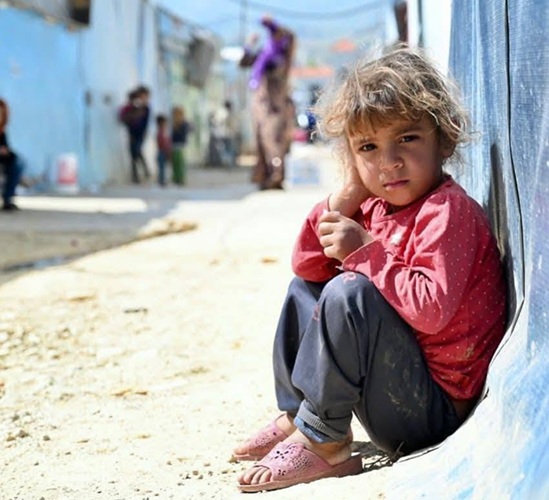By Tony Henderson
Thousands of Yazidis are facing death in the Iraq mountains after the organisation calling itself Islamic State (IS) took over the town of Sinjar, and also, the largest Christian town in the region, which together have fallen to the interlopers, causing the Christian archbishop there to appeal for help. Little however is being said about the plight of the Yazidis well, not until the USA wanted to bomb the IS!
The Yazidi – who have long-been termed ‘devil worshippers’ by the locals – because one of the Islamic faith’s foundational narratives of a fallen angel is similar to that of shaitan (or Satan) – have been forced to flee. Entire families, fleeing the violence in Sinjar are left stranded in their thousands in the mountains of northern Iraq.
The United Nations estimates up to 50,000 Yazidis – one of Iraq’s oldest minority sects – are faced with a bleak choice: descend from the mountains and risk slaughter at the hands of militants, or remain there, and risk dying of thirst.
The IS zealots have already taken over such cities as Mosul and Tikrit, and have now moved into the surrounding areas, like the Yazidi town of Sinjar. In their wake came reports of Yazidis being summarily executed and of holy places of worship being blown up, some of Sufi saints.
The Yazidis are dualists, as opposed to the monists of the orthodoxies of the Jewish, Christian and Islamic faiths. As a monotheistic religion, the conflict between dualism and monism has existed in Christianity since its inception, also in Islam. Polytheism continues in all of the major religions, often at the fringes; animistic beliefs, Shamanistic beliefs are very widespread. There is a great danger and misconceptions in those efforts at cleansing or purifying the population so steeped in its traditional norms, which include freedom of belief.

Iraqi Yazidi women who fled the violence in the northern Iraqi town of Sinjar sit at a school where they are taking shelter in the Kurdish city of Dohuk. Courtesy: Yahoo.com
Basically, the intolerance of the fundamentalists is to blame for much of the religious violence today. While those with the human virtue of tolerance (so long as the ‘other faiths’ don’t subvert or impose), are seldom in positions of power. So, they do not have anything in particular to defend, no crusade, they just live by their faith and live life. This latter attitude of non-violence and nondiscrimination has allowed entirely different communities to live peaceably together.
If the IS want to put Sharia law into effect, which is not a bad thing if well done and not forced by narrow minded bigots, society would vastly improve – as shown by the Talaban in Afghanistan who rid the entire region of opium, heroin etc during their short tenure and which, in their absence, is back in full flow again with the trade in arms, drugs, corruption, adverse militarism etc rampant.
However, beyond all those discussions, word is coming through of thousands of Yazidis already killed: “In one day, they killed more than two thousand Yazidi in Sinjar, and the whole world says, ‘Save Gaza, save Gaza,” was one poignant comment.
That lament of an Iraqi named Karim, as quoted in The New Yorker, captures the helpless frustration of many minorities facing existential danger in areas now taken over by IS.
To recap: before the latest conflict started in Gaza in early July, IS had attacked parts of northern Iraq and was threatening Baghdad. Since then it has consolidated its hold on regions of northern Iraq and eastern Syria. Iraq’s second-largest city, Mosul, is in effect the group’s capital.
IS is led by Abu Bakr Al-Baghdadi, and opposes fellow Sunni Muslims, Arab or Kurd, and is dead set against Shiites, the majority in Iraq, and dominant in the central government in Baghdad, but who are a minority in the north.
Another minority, the mostly Christian Assyrians, have also fled south, and now await support from the Christian West. The Yazidi, have neither international support nor nearby refuge. And, IS seems to have identified them for special persecution.
The Yazidis apparently number about 500,000, and are concentrated around Sinjar; this group is ethnically Kurdish and its belief system has some characteristics of ancient Zoroastrianism.
Alongside the Yazidi problem Iraq’s largest Christian town Qaraqosh – which lies between Mosul, the jihadists’ main hub in Iraq, and Arbil, the Kurdish region’s capital. It usually has a population of around 50,000 – and surrounding areas, have fallen to the IS. That sent tens of thousands of panicked residents fleeing towards autonomous Kurdistan, officials and witnesses said. The Kurdish Peshmerga troops withdrew rapidly but that might have been a strategic retreat.
“I now know that the towns of Qaraqosh, Tal Kayf, Bartella and Karamlesh have been emptied of their original population and are now under the control of the militants,” Joseph Thomas, the Chaldean archbishop of Kirkuk and Sulaimaniyah, told AFP news agency.
Tal Kayf, the home of a significant Christian community, as well as members of the Shabak Shiite minority, also emptied overnight.
IS, which first emerged in Syria’s war in spring 2013, has since imposed near-total control in Raqa province and Deir Ezzor on the Iraq border. In June, the group proclaimed a “caliphate” straddling Syria and Iraq. Some Western-backed rebels seeking President Bashar al-Assad’s ouster initially welcomed IS as a potential ally. But the extremist group’s abuses and quest for domination have turned the opposition against it. (Quoted from AFP)
“There are children dying on the mountain, on the roads,” said Marzio Babille, the Iraq representative for the United Nations Children’s Fund (UNICEF). “There is no water, there is no vegetation, they are completely cut off and surrounded by Islamic State. It’s a disaster, a total disaster.”
Iraqi politician Vian Dakhil made an impassioned plea for the protection of the Yazidi people before Iraqi parliament. “Children have died because of dehydration and lack of food,” the Yazidi parliamentarian from Sinjar, said through tears. “My people are being slaughtered.”
The dramatic advance of the extremist Sunni fighters has torn the ethnic and religious fabric of the country apart, with Christians and Shiites also uprooted from cities and towns. Some 147,000 have arrived in the semi-autonomous Kurdish region, flooding refugee camps.
Now, with more bombs falling, the sad story of Iraq continues in the unfolding and the hitherto unknown Yazadis are in the headlines but for how long?
Tony Henderson is a freelance writer working in Hong Kong, since 1980, and previously Japan, for seven years following two years in Mauritius after a year in Libya. Long time participant in the Humanist Movement and spokesman for Universal Humanism in Hong Kong.






0 Comments